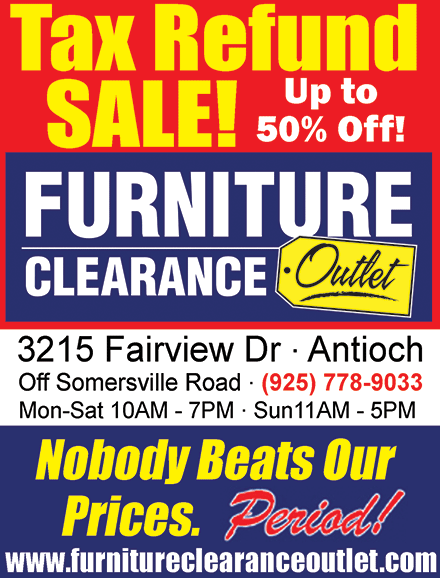Council Expects Stable Budget Next Year, Facing Trouble in Following Years
By James Ott
Antioch’s financial future is stable for now, say city officials, but there could be trouble on the horizon.
Through tough cuts and budget restructuring, City Manager Jim Jakel said that Antioch should end this year with a positive budget, but that the city is facing a “significant deficit” after the 2013 fiscal year.
During a special meeting held before the city council meeting on Tuesday, April 24, Jakel and other city staff gave a presentation highlighting budgetary changes and concerns for the city’s General Fund.
The major problem facing the city? A lack of revenue, according to Jakel.
With a population of over 100,000 people, Antioch’s revenue’s have dropped from $47 million plus in the 2006 – 2007 fiscal year to about $34.5 million in 2011 – 2012.
That is a $34.5 million budget for a city with over 100,000 people. Compare that to a neighboring city like Brentwood that has only 52,000 people and a $37 million budget, say city staff and it becomes apparent why some are worried about the city’s ability to provide basic services for its citizens down the road.
“We need to generate revenue, said Jakel. “Home sales need to increase or the voters need to approve a tax measure or we need to pull a rabbit out of a hat with respect to city revenue.”
According to Finance Director Dawn Merchant, the main culprit for the large budget shortfall over the last few years is the sharp declines in revenue generated by taxes – mainly property tax and sales tax. Those two big money generators of course, come from two of the hardest hit areas in this tough economy: home ownership and sales, and businesses sales.
A full 75 percent of the city’s revenue this fiscal year was generated from taxes. Of that total 44 percent came from property tax, and a full 40 percent from sales and use tax. And the city expects 76 percent of next year’s revenue will come from taxes.
A smaller problem for Antioch has been its increase in expenditures despite its falling revenue.
Despite nearly $3 million in employee concessions and nearly 40 percent of Antioch’s approved positions vacant due to harsh cuts, the city is expecting to spend $100,000 more next year than the current year – a small increase but a sign of the difficulties facing the city despite its efforts to balance its budget.
Some good news from Merchant is that increased sales tax revenue this fiscal year has generated $300,000 over last year. That comes from sales tax income increasing by 8.4 percent from March of last year to March 2012, she said. And that bodes well for Antioch as it follows the uptrend that the rest of the state has experienced. Sales tax in California as a whole was up 8.8 percent in that same period.
The city may also be able to gain some much additional revenue from redirected water rights refunds. Antioch has water rights and every year they have the possibility of being reimbursed from the Department of Water Resources for any excess useable water.
That money would normally go to Antioch’s Water Enterprise Fund but the city received opinion from legal council that the city owns those water rights, not the water enterprise fund because it is not a separate legal entity. In budget subcommittee meetings the city decided that any future water refunds would now go into the General Fund.
If the city receives a refund, has a budget surplus and meets their annual 10 percent reserve, then the moneys received would be used to replenish the litigation and replacement reserves.
And it there is a budget deficit it was suggested that the refund money be used to reduce the deficit.
Although Merchant said that the city could potentially pick up these forms of revenue in the future and possibly even more from unused employee overtime, it all may not be enough.
While Antioch’s current fiscal year will end on June 30 with about $152,000 in surplus, if the city can’t find an answer to its revenue shortage, Antioch will still be in a $2.4 million hole at the end of the next fiscal year, which begins July 1 this year.
City staff and council members all agreed that although they’ve worked hard and made sacrifices, their work to keep Antioch afloat is far from over yet.
“We’re in a difficult state here,” said Fakel. “Fortitude and creativity to do what people didn’t think we could do in the first place has … staved off the serious nature of the situation. But don’t take it as a false sense that we’re out of the woods. It’s a daunting task.”
Tuesday was the first of the three special budget meetings that will take place an hour before City Council Meetings until the budget is set to be adopted on June 26.
Also at the Meeting:
In a move they say does not set a precedent, the council voted 3-1 with Councilman Gary Agopian dissenting, to ignore staff suggestions and allow Mike Rose’s Auto Body to keep their unapproved landscaping changes.
In 2010 Mike Rose’s Auto Body applied to make landscaping changes to his business at 1001 Auto Center Drive.
The city approved some but not all of the landscaping changes and after a routine site inspection several discrepancies were noticed between what the city had approved and what was actually constructed.
Those changes included artificial turf in place of real grass, and a lack of a covered garbage enclosure.
A representative for Mike Rose’s Auto Body told staff that they preferred to keep the landscaping modifications that they made, despite the fact that it was a design that was not approved by the city, so it was reviewed by staff and the city’s zoning administrator.
After the review, the zoning administrator decided that the changes were substantial and so needed to be taken before the planning commission for a final decision.
At the planning commission review, Brennan Rose said that he and the company had thought the changes they made to the landscaping were improvements and did not consider that they would create a problem. Rose explained that the turf was more water efficient and that it would last longer. This, he said would keep his business and thus that part of Antioch, looking better for longer than would the approved landscaping changes.
After the planning commission eventually passed a motion requiring Rose to make changes, he appealed the decision.
At Tuesday’s meeting, staff explained the concern with Rose’s unauthorized changes.
City staff said that natural grass acts as a bio filter and drains storm water through a pipe into a public storm drain. Synthetic turf, they say is mainly impervious and as it is currently designed at Mike Rose’s Auto Body, the slope of the turf would cause storm water to not drain properly and so pool up on the sidewalk. Also all commercial sites containing trash compactors like Mike Rose’s Auto Body have to have a roof on their trash enclosure according to city mandates.
After discussion, city council members and the Mayor said that Mike Rose’s Auto Body had no ill intentions and only made changes they thought would benefit the city. They also cited all of the good the company has done for the city of Antioch and so decided to allow the business to keep all of its changes without any adjustments.
Mayor Jim Davis explained the thought process behind the decision:
“I’m not saying we can make exceptions every time, but when someone goes above and beyond to take a corner that represents a lot to our community and make it better, this is a case where I’d be willing to make an exception and go forward,” said Davis. “They are an asset to our community and they contribute to our tax base.”





















we don’t need to pull rabbits out of hats, we just need to do the right thing during the november election.
vote kalinowski, rocha, davis out of office. jakel needs to go.
the city needs to do the right think.
any and all purchases need to be done at local businesses…period
any and all contract work needs to go to local businesses
sell/ rent/ lease out the water park, the community center, the animal shelter.
no more raises, or any kind of special pay (extra holidays etc) for any of the city employees
cap the salaries to $ 120,000 of any city employee. period
no special treatment to special interest group
no free things like water etc for anybody
any services from city staff need to be covering cost.